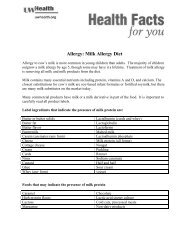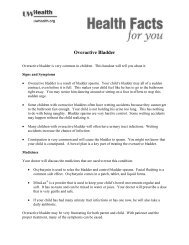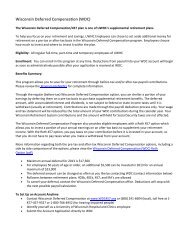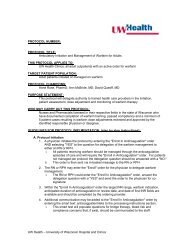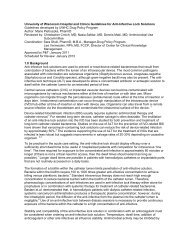Antimicrobial Use Guidelines (AMUG) version 21 - UW Health
Antimicrobial Use Guidelines (AMUG) version 21 - UW Health
Antimicrobial Use Guidelines (AMUG) version 21 - UW Health
You also want an ePaper? Increase the reach of your titles
YUMPU automatically turns print PDFs into web optimized ePapers that Google loves.
Drug InteractionsClarithromycin is an inhibitor of CYP3A4 and may increase serum levels of the following drugs that are CYP3A4substrates or may be metabolized by CYP3A4 in some individuals with CYP2D6 deficiency; dose reductions may benecessary if the drugs are administered concomitantly with clarithromycin (* = contraindication):Alfentanil Darunavir/ritonavir Ixabepilone SolefenacinAlfuzosin Dasatanib Lapatanib SunitinibAlosetron Dronaderone Lovastatin TacrolimusAmbrisentan Ergot alkaloids* Maraviroc TadalafilAprepitant Eletriptan Nifedipine TedisamilAtorvastatin Eplerenone Nilotinib TemsirolimusBenzodiazepines Erlotinib Oxybutynin TheophyllineBortezomib Estrogens Paracalcitol TolterodineBosentan Eszopiclone Phenytoin TolvaptanBromocriptine Etravitine Repaglinide TrazodoneCarbamazepine Everolimus Rifabutin Valproic acidCilostazol Fentanyl Salmeterol VardenafilCinacalcet Fesoterodine Saquinavir VenlafaxineColchicine Fluoxetine Saxagliptin VerapamilConivaptan Fluticasone Sildenafil VinorelbineCorticosteroids Fluoxetine Silodosin WarfarinCyclosporine Fosaprepitant SimvastatinDarifenacin Imatinib SirolimusClarithromycin may result in QTc prolongation when administered with the following drugs, and concurrent use should beavoided (* = contraindication):Amiodarone Droperidol Levomethadyl SertindoleAmoxapine Enflurane Locainide SpiramycinArsenic trioxide Erythromycin Mefloquine SulfamethoxazoleAtazanavir Flecainide Mesoridazne TelithromycinArtemether Fluconazole Octreotide Terfenadine*Azimilide Foscarnet Pentamidine ThioridazineBepridil Gemifloxacin Pimozidel Tricyclic antidepressantsBretylium Halofantrine Probucol TrifluoperazineChloral hydrate Haloperidol Procainamide TrimethoprimChloroquine Halothane Prochlorperazine VasoressinChlorpromazine Ibutilide Propafenone VoriconazoleCisapride* Hydroxyquinidone Quetiapine ZiprasidoneDisopyramide Iloperidone Quinidine ZolmitriptanDofetilide Isoflurane RanolazineDolasetron Isradipine RisperidoneThe following miscellaneous drug interactions occur with clarithromycin:Delavirdine, lopinavir and ritonavir increase serum levels of clarithromycin and may increase its side effects.Rifabutin and nevirapine decrease serum levels of clarithromycin and may decrease its efficacy.With indinavir, tipranivir and itraconazole, serum levels of both drugs are increased.Clarithromycin decreases serum levels of zidovudine.There is an increased risk of hypoglycemia when clarithromycin is administered with glipizide, glimepride or glyburide.There is an increased risk of drug rash when clarithromycin is administered with efavirenz.Clarithromycin decreases metabolism of digoxin by intestinal bacteria and can increase serum digoxin levels.Clarithromycin decreases the efficacy of BCG.Concurrent administration with lansoprazole has been reported to cause glossitis and blackening of the tongue.Concurrent administration with paroxetine has been reported to result in serotonin syndrome.Concurrent administration with prednisone increases the risk of psychotic symptoms due to prednisone.






